

We are working to enhance corporate governance throughout the Toyoda Gosei Group so that we can continue to be a trusted company. To create a fair and transparent corporate governance system, while we ensure its effectiveness through management supervision and audits by outside directors and outside Audit & Supervisory Board members, we improve the appropriateness and efficiency of our operations by developing and operating an internal control system. Furthermore, we are also promoting legal compliance, corporate ethics, and risk management activities.
Corporate Governance
Basic Philosophy
We view the enhancement and strengthening of corporate governance with the aim of ensuring sound and efficient corporate management to be crucial in achieving sustainable growth. Based on this, we are building and maintaining fair and transparent management systems and organizational systems that can respond precisely to environmental changes.
Additionally, Toyoda Gosei pursues consummate corporate governance by voluntarily implementing a range of policies in accord with the letter and spirit of the ideals and principles in Japan’s Corporate Governance Code, formulated and revised in June 2021, by the Financial Services Agency and the Tokyo Stock Exchange.
Corporate Governance System
Corporate Governance System
Toyoda Gosei has adopted an audit and supervisory board system and set up the shareholders’ meeting, Board of Directors, Audit & Supervisory Board, and accounting auditors as statutory entities. We have also put in place internal auditors and other internal control systems including internal audits. The Board of Directors consists of nine directors and holds regular monthly meetings (extraordinary meetings held as needed), where matters prescribed by law or in the Articles of Incorporation and important matters related to corporate management are reported, discussed, and resolved.
A system of corporate officers is used to speed up decision-making and business execution. For important business matters, division chief meetings and management meetings are held monthly. Functional meetings and committee meetings relevant to key areas such as technology, costs, and personnel are also held as needed to ensure appropriate management decisions.
The Audit & Supervisory Board consists of five members and holds regular meetings. Members also attend important meetings such as Board of Directors’ meetings and audit each department and subsidiary, through which they fulfill their function of auditing corporate management.
Accounting auditors are external auditors who combine auditing functions with a commitment to ensuring an independent and fair auditing system. The Company adopts the current system because audit, supervisory, and execution functions are well coordinated with each other under this structure, with legality and efficiency of the Company's decision-making and business execution sufficiently ensured.
Also, in order to strengthen the supervisory function of the Board of Directors and to increase the objectivity and transparency of the decision-making process, we have established the Executive Appointment Committee and Executive Compensation Committee under the Board of Directors as non-mandatory advisory committees.
Executive Compensation Committee and Executive Appointment Committee
Toyoda Gosei’s Executive Compensation Committee and Executive Appointment Committee are composed of members of which more than half are outside directors. The chair of both committees is appointed from outside directors to further enhance transparency and objectivity. (Each committee met once in FY2021)
■Committees roles and composition
| Name | Role | Members |
|---|---|---|
| Executive Compensation Committee | Deliberates and reports on the compensation system for directors and their individual compensation (restricted stock-based compensation, etc.) | Toru Koyama, president, Naoki Miyazaki, director, Sojiro Tsuchiya, outside director, Kimio Yamaka, outside director (chairperson), Mayumi Matsumoto, outside director |
| Executive Appointment Committee | Deliberates and reports on proposals regarding the appointment and dismissal of directors and Audit & Supervisory Board members (appointment of the president, etc.) | Toru Koyama, president, Naoki Miyazaki, director, Sojiro Tsuchiya, outside director, Kimio Yamaka, outside director (chairperson), Mayumi Matsumoto, outside director |
Changes In Numbers of Directors and Audit & Supervisory Board Members
In 2012, Toyoda Gosei adopted a system of corporate officers and downsized its Board of Directors to nine directors from 23 as of 2011. It appointed its first outside director in 2015.
The Board currently comprises nine directors, three or one-third of whom are outside directors. One of the outside directors is a woman. The outside director appointments have increased the Board’s objectivity and diversity.
Directors (People)
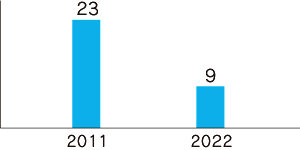
■Audit & Supervisory Board (ASB) members (People)
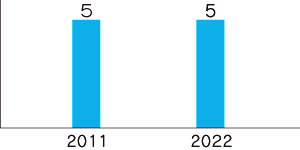
■Outside Director Ratio
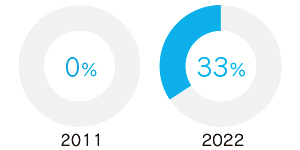
■Outside ASB Member Ratio
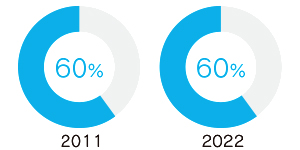
■Female Director Ratio
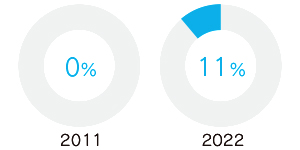
■Female ASB Member Ratio
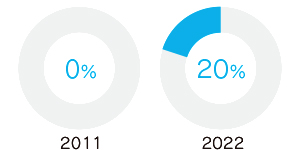
Policies and Procedures to Appoint and Remove Senior Officers and Nominate Candidates for Directors and Audit & Supervisory Board Members
Nominations of candidates for directors and Audit & Supervisory Board members are made after deliberation and reporting by the Executive Appointment Committee, followed by a resolution of the Board of Directors then at a Shareholders’ Meeting.
The nomination policy for senior officer and director candidates is based on the candidate’s popularity in terms of their ability to make accurate and prompt decisions after taking into account the balance of knowledge, experience, and capabilities of the management team and the Board of Directors as a whole. The candidates are comprehensively nominated and appointed on the basis of their ability to wholeheartedly comply with laws and corporate ethics.
The nomination policy for Audit & Supervisory Board member candidates is to comprehensively nominate candidates from the perspective of putting the right person in the right position while ensuring a balance between diverse perspectives on corporate management, including knowledge of finance, accounting, and legal affairs, and knowledge of the Company’s business.
If a candidate for senior officer or director is found to have committed any fraudulent act or seriously violated any law or regulation, or the Articles of Incorporation, we will take procedures for their dismissal.
■Skills Matrix
| Name | Position at Toyoda Gosei |
Executive Appointment Committee |
Executive Compensation Committee |
Corporate management |
Governance | Overseas operations |
Manufacturing (production/ quality management) |
Technology | Sales | Finance | Personnel | Environment and energy |
DX | New business (non- automotive) |
|---|---|---|---|---|---|---|---|---|---|---|---|---|---|---|
| Toru Koyama |
President | ○ | ○ | ● | ● | ● | ● | ● | ● | |||||
| Tomonobu Yamada |
Executive Vice President |
● | ● | ● | ● | |||||||||
| Hiroshi Yasuda |
Director | ● | ● | ● | ● | ● | ● | ● | ||||||
| Masaki Oka |
Director | ● | ● | |||||||||||
| Takashi Ishikawa |
Director | ● | ● | ● | ● | ● | ||||||||
| Naoki Miyazaki |
Director | ○ | ○ | ● | ● | ● | ● | ● | ● | ● | ||||
| Sojiro Tsuchiya |
Director Outside Independent |
○ | ○ | ● | ● | ● | ● | ● | ● | |||||
| Kimio Yamaka |
Director Outside Independent |
◎ | ◎ | ● | ● | ● | ||||||||
| Mayumi Matsumoto |
Director Outside Independent |
○ | ○ | ● | ● | |||||||||
| Kenji Oiso | ASB member | ● | ||||||||||||
| Yamato Suzuki (appointed in June 2021) |
ASB member | ● | ||||||||||||
| Chika Kako |
ASB member Outside |
● | ● | ● | ||||||||||
| Hideomi Miyake |
ASB member Outside Independent |
● | ● | ● | ||||||||||
| Hitoshi Kuwayama (appointed in June 2022) |
ASB member Outside Independent |
● |
| Attendance at Board of Directors’ (BoD) , Audit & Supervisory Board (ASB) meetings (Apr. 2021–Mar. 2022) |
|---|
| 13/13 (BoD) |
| 13/13 (BoD) |
| 13/13 (BoD) |
| 13/13 (BoD) |
| 13/13 (BoD) |
| 13/13 (BoD) |
| 13/13 (BoD) |
| 13/13 (BoD) |
| 13/13 (BoD) |
| 13/13 (BoD) 12/12 (ASB) |
| 11/11 (BoD) 10/10 (ASB) |
| 13/13 (BoD) 12/12 (ASB) |
| 13/13 (BoD) 12/12 (ASB) |
| ー |
Note: “ ◎ ” denotes the committee chairperson.
Board of Directors
The Board of Directors deliberates from many different angles on the direction of management, including management and business strategies, then reports and discusses on progress after any necessary resolutions have been passed. In such a way, the Board supervises from a number of different viewpoints on whether management strategies are being executed appropriately. In addition to strengthening the Company’s internal control system and risk management system, in recent years the Board of Directors has been working to achieve sustainable corporate growth amid a chaotic business environment of political instability, worsening environmental problems, and COVID-19 pandemic.
Main Matters Discussed by the Board of Directors in FY2021
| Theme | Main matters discussed |
|---|---|
| Management / Business strategies |
|
| Corporate |
|
| Investment and Loan Projects |
|
Number of Matters Discussed by the Board of Directors in FY2021
| 1Q | 2Q | 3Q | 4Q | Total | |
|---|---|---|---|---|---|
| Matters Resolved | 21 | 3 | 7 | 11 | 42 |
| Matters Reported | 12 | 6 | 10 | 7 | 35 |
| Total | 33 | 9 | 17 | 18 | 77 |
Evaluation of the Effectiveness of the Board of Directors
Effective functioning of corporate governance is essential for the Company's sustainable growth, to enhance corporate value, and to contribute to the sustainable development of society. Therefore, to ensure the effectiveness of the roles and responsibilities of the Board of Directors, evaluations and opinions are heard every year from members of the Board. The Board of Directors then analyzes, evaluates, and deliberates on measures for improvement. In FY2021, debriefings with all nine directors and all five Audit & Supervisory Board members were conducted to assess their performance. As a result, Toyoda Gosei found no material deficiencies across any of its assessments and concluded that the Board continues to function effectively.
Of particular note, the Board received high ratings for its openness and candid discussions, its agenda that focused heavily on key issues, and its support for outside officers. However, the Board’s discussions on medium- to long-term policies, which have been regarded as an issue for some time, were evaluated as needing further improvement. Outside directors stated their opinions on ensuring greater opportunity for face-to-face discussions among directors, and for having the chance to once again make on-site visits to understand the actual situation on the front line, both of which had been suspended due to the pandemic. Accordingly, Toyoda Gosei is now taking measures to improve communication through direct, on-site visits by conducting tours of business sites and arranging roundtable discussion-type meetings to exchange views. Opinions were also expressed with an eye on the future, addressing the need to add more diversity to the Board. As such, Toyoda Gosei will continue to strive to ensure diversity by highlighting the experience and expertise required for the growth of the Company in a skills matrix.
Board Effectiveness Evaluation Process
- Evaluation Method
- Interview: Nine directors and five Audit & Supervisory Board members
Evaluation process: Analysis of interviews and debriefing results to ensure anonymity
- Debriefing Items (Main Items)
-
- Roles and responsibilities of directors
- Oversight function of the Board
- Deliberations within the Board
- Support for outside officers
FY2021 Board Effectiveness Evaluation Results
| Issues Identified | Measures |
|---|---|
| Enhancing discussions on medium- to long-term plans and future visions | Further increase opportunities for discussion and reporting at the Board of Directors’ meetings on initiatives to improve corporate value and mediumto long-term management strategies in response to changes in the business environment |
| Discussions on measures to respond to environmental changes (CASE, electrification, etc.) | |
| Explanations on the background of individual investments and their relationship with mediumto long-term strategies | Discuss individual projects at an executive level after indicating the direction of capital investment to make projects easier to understand |
| Ensuring time for outside officer liaison meetings | Extend time given for officer liaison meetings for further exchange of ideas and discussions |
| Ensuring further diversity of the Board | Continue selection of diversity- conscious candidates by arranging experience and expertise required for the growth of the Company in a skills matrix |
Issues Evaluated in FY2020 for Board Effectiveness and Status of Initiatives in FY2021
| Main Feedback (Issues) in FY2020 | Initiatives in FY2021 |
|---|---|
| Insufficient discussion on medium- to long-term issues such as core competencies and carbon neutrality that will serve as future growth strategies | Reported and discussed long-term business strategies beyond 2025 at Board meetings and at outside officer liaison meetings |
| Ensuring further diversity of the Board | Considered to be an ongoing issue so that appropriate candidates continue to be selected (ongoing in FY2022) |
Expected Roles of and Support for Outside Directors
All three outside directors possess a wealth of experience and keen insight.
Mr. Tsuchiya’s experience and expertise lie in global strategy and production engineering; Mr. Yamaka’s, in finance and the environment; and Ms. Matsumoto’s, in the environment and SDGs. Ms. Matsumoto is Toyoda Gosei’s first female director.
The three adeptly fulfill monitoring and advisory roles in addition to actively participating in Board discussions. In their monitoring role, they receive support in the form of departmental briefings on business operations and challenges and direct access to frontline operations through on-site visits to domestic and overseas subsidiaries to better understand the actual state of operations. Additionally, they are briefed in advance on the content and background of resolutions to be voted on at Board meetings to facilitate sound decision-making.
At the same time, the outside directors advise management on company direction and business challenges. Advisory opportunities include regularly scheduled liaison meetings attended by all outside directors and outside Audit & Supervisory Board members, each of whom attends various other meetings also, including the Sustainability Meeting, Sales and Technical Meeting, Carbon Neutrality and Environmental Committee, and ad hoc meetings.
Internal Audits, Audit & Supervisory Board Membersʼ Audits, and Accounting Audits
We have set up the Audit Division to handle internal audits. With the aims of achieving business objectives and preventing misconduct and mistakes, internal audits are conducted across the overall business (including audits of functional departments) based on an internal auditing plan approved by management at the beginning of each term.
The results of internal audits are reported to management, and audited departments are given recommendations for improvements based on the audit results. The effectiveness of internal audits is increased by checking their improvement plans and results.
Each Audit & Supervisory Board member follows the auditing policy and audit plan established by the Audit & Supervisory Board when investigating the Company and subsidiaries. They attend the meetings of important deliberative bodies and committees including the Board of Directors, Chief of Headquarters Meetings and Management Meetings, listen to reports on business from directors and others, inspect financial statements and other important documents, and conduct on-site audits of offices and subsidiaries to audit the performance of duties by directors from the perspectives of ensuring legality and appropriateness, protecting assets and rights, and preventing loss. Moreover, a special department has been established to assist the auditors’ audits.
The certified public accountants who performed the FY2021 accounting audit of Toyoda Gosei are Yasuhiro Nakajima and Satoko Nakatani of PricewaterhouseCoopers Aarata LLC.
Audit & Supervisory Board members, internal auditing department personnel, and accounting auditors regularly meet to confirm their respective auditing systems, auditing policy, auditing plans, implementation status, and audit results. They cooperate in performing efficient and effective audits, contacting each other as needed to exchange ideas and share information.
Internal Control Systems
In accordance with the provisions of Japan’s Companies Act, Toyoda Gosei has formulated a Basic Policy on Establishing Internal Controls. Under this policy, we are striving to ensure appropriate operations by establishing internal control systems, which help us deliberate important matters, establish related rules and guidelines, and handle internal audits, compliance and risk management. Every year, the Board of Directors checks the status of establishment and operation of internal controls in an ongoing initiative to improve and reinforce them.
To cultivate a healthy internal control environment at Toyoda Gosei and its subsidiaries, all Group companies share its management philosophy. The Toyoda Gosei Group Charter for Business Ethics, a shared guideline for compliance, has also been instituted and expanded to subsidiaries. While respecting the independence of subsidiary management, we receive regular business reports from subsidiaries and set up systems to confirm the propriety and legality of subsidiaries’ businesses through advance approval reports. We also send non-executive directors and Audit & Supervisory Board members to key subsidiaries in a system to monitor and act as a check on their business execution.
■Corporate governance system
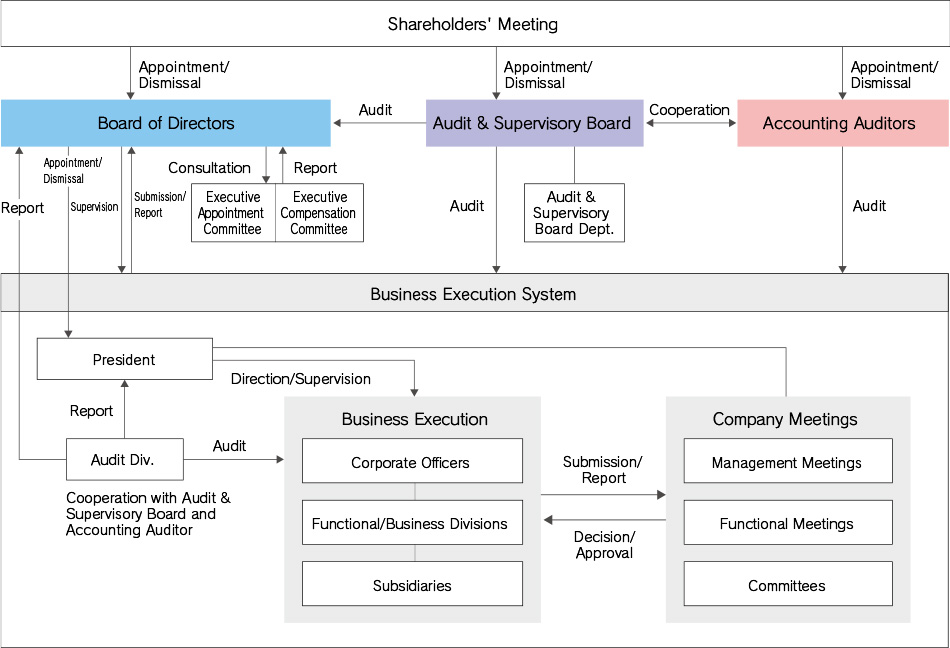
■Main Meetings & Committees
| Meeting Name | Division in Charge | |
|---|---|---|
| Management Meetings |
Board of Directors | General Administration |
| Sustainability Meeting | Corporate Planning | |
| Chief of Headquarters Meeting | Corporate Planning | |
| Management Meeting | Corporate Planning | |
| Functional Meetings |
Sales and Technical Meeting | Sales Planning, Automotive Business Management |
| Research and Development Meeting | Technical Planning, Production Engineering Management | |
| Profit and Cost Meeting | Finance & Accounting | |
| Production and Purchasing Meeting | Automotive Business Management, Purchasing | |
| Human Resources Meeting | Human Resources | |
| IT Planning Meeting | IT Planning | |
| Committees | Internal Control Committee | Corporate Planning, Legal, Auditing |
| Export Control Committee | Auditing | |
| Central Safety and Health Committee | Safety and Health Committee | |
| Carbon Neutrality and Environmental Committee | Carbon Neutrality and Environment Promotion | |
| Quality Committee | Quality Assurance | |
Corporate Governance Report
Management Members
Directors and Audit & Supervisory Board Members
Directors and Audit & Supervisory Board Members
At its annual Shareholders’ Meeting, held on June 16, 2022, Toyoda Gosei appointed Sojiro Tsuchiya, Kimio Yamaka, and Mayumi Matsumoto as outside directors and Hitoshi Kuwayama as an outside Audit & Supervisory Board member. Including Chika Kako and Hideomi Miyake, who are currently in office, a total of three outside Audit & Supervisory Board members have been appointed.
■Election of Outside Directors and Outside Audit & Supervisory Board Members
| Appointment | Name | Independent Director/Auditor | Reason for Appointment |
|---|---|---|---|
| Outside directors |
Sojiro Tsuchiya | ○ | To benefit from his management oversight and advice based on his extensive experience, including as a director of Denso Corporation, and his expertise, including full-spectrum manufacturing expertise cultivated over decades at Denso and other companies/groups. Mr. Tsuchiya has been designated as an independent director because he meets the requisite criteria and is deemed free of potential conflicts of interest with regular shareholders. |
| Kimio Yamaka | ○ | To benefit from his management oversight and advice based on his extensive experience and expertise in finance, particularly policy finance, project due diligence, and the environmental and energy sectors. Mr. Yamaka has been designated as an independent director because he meets the requisite criteria and is deemed free of potential conflicts of interest with regular shareholders. | |
| Mayumi Matsumoto | ○ | To benefit from her management oversight and advice based on her extensive experience and high-level insight as a news anchor and researcher in the broad fields of social issues, environment, and energy in the management of Toyoda Gosei. Ms. Matsumoto has been designated as an independent director because she meets the requisite criteria and is deemed free of potential conflicts of interest with regular shareholders. | |
| Outside Audit & Supervisory Board members | Chika Kako | To reflect in Toyoda Gosei’s audits her wealth of experience and keen insight gained from her career at Toyota Motor Corporation, where she served mainly in vehicle development and materials development roles and was involved in management as a managing officer. | |
| Hideomi Miyake | ○ | To reflect his extensive experience and deep insight as a corporate manager in the auditing of Toyoda Gosei. Mr. Miyake has been designated as an independent auditor because he meets the requisite criteria and is deemed free of potential conflicts of interest with regular shareholders. | |
| Hitoshi Kuwayama | ○ | To reflect his extensive experience and deep insight as a lawyer in the auditing of Toyoda Gosei. Mr. Kuwayama has been designated as an independent auditor because he meets the requisite criteria and is deemed free of potential conflicts of interest with regular shareholders. |
Executive Compensation
Directors’ compensation consists of monthly fixed compensation and performance-based compensation in the form of cash bonuses (short-term incentive) and stockbased compensation (long-term incentive) based on the idea that directors should be appropriately incentivized to pursue sustained growth in Toyoda Gosei’s value. Directors’ compensation is split roughly 70:20:10 among monthly compensation, cash bonuses, and stock-based compensation, respectively.
Monthly compensation is set at a fixed amount that reflects the recipient’s job responsibilities and experience as well as compensation levels at other companies. Cash bonuses are based primarily on fiscal yearly consolidated operating profit. Secondary variables that factor into their determination include the degree to which fiscal yearly plans are attained, employees’ bonus levels, bonus levels at other companies, medium- to long-term earnings, previously paid bonus amounts, and contributions to ESG management. Stock-based compensation is intended as an incentive to pursue sustained growth in Toyoda Gosei’s value. It is paid in the form of restricted stock to promote greater sharing of value with shareholders.
Directors’ aggregate annual cash compensation (monthly compensation plus bonuses) is capped at ¥650 million (outside directors’ share of which is capped at ¥65 million). Directors’ aggregate annual restricted stock-based compensation is capped at ¥100 million (outside directors are not eligible for restricted stock-based compensation). All three compensation caps were approved at the annual Shareholders’ Meeting on June 12, 2020.
Outside directors and Audit & Supervisory Board members receive only fixed monthly compensation because their role is to oversee and monitor management from an independent vantage point.
Individual directors’ compensation is set in accord with the above policies following a fair and transparent review/ reporting process by the majority-independent Executive Compensation Committee, established in 2019.
At Executive Compensation Committee meetings, outside directors have made suggestions about further enlarging the incentive element of director compensation by, e.g., adjusting compensation to reflect the extent of directors’ respective environmental contributions.
■Director Compensation Scheme
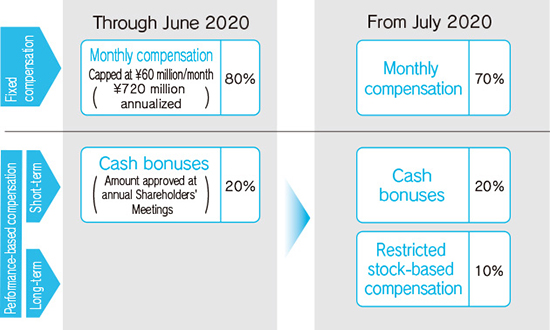
■Total Compensation for Each Officer Class, Total by Each Type of Compensation, and Number of Officers Receiving the Compensation
| Officer Class | Total Executive Compensation (Millions of yen) |
Total Amount by Type of Compensation (Millions of yen) | Number of Subject Officers (People) |
||
|---|---|---|---|---|---|
| Fixed Compensation |
Performance-based Compensation |
Non-cash Compensation |
|||
| Monthly Compensation |
Cash Bonuses |
Stock-based Compensation |
|||
| Directors (excluding outside directors) |
334 | 231 | 74 | 28 | 6 |
| Audit & Supervisory Board members (excluding outside members) |
75 | 75 | - | - | 3 |
| Outside officers | 70 | 70 | - | - | 6 |
*Bonuses are the provision of allowance in the given fiscal year
*Effective from April 1, 2021 to March 31, 2022